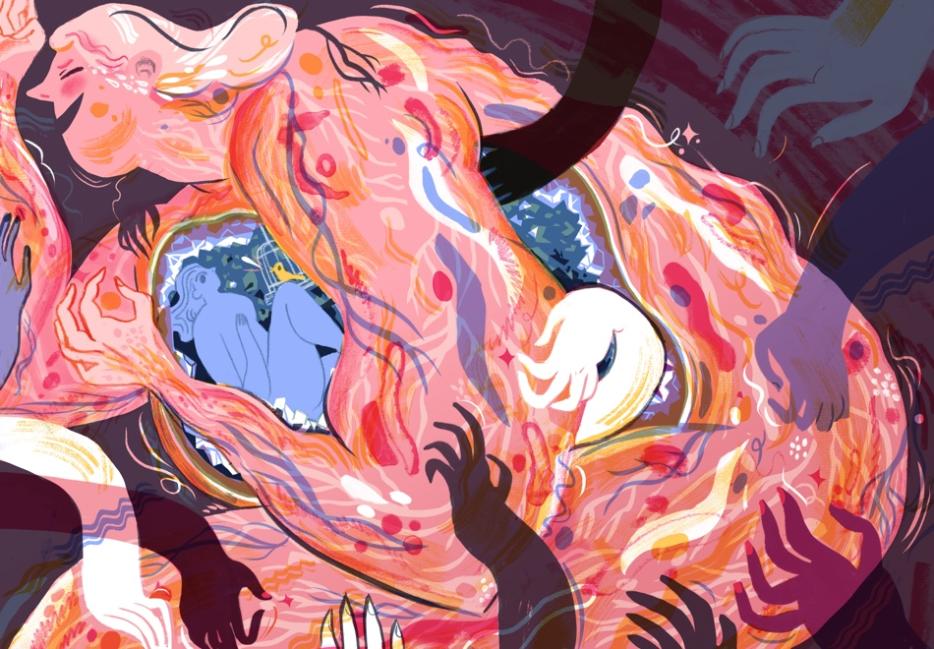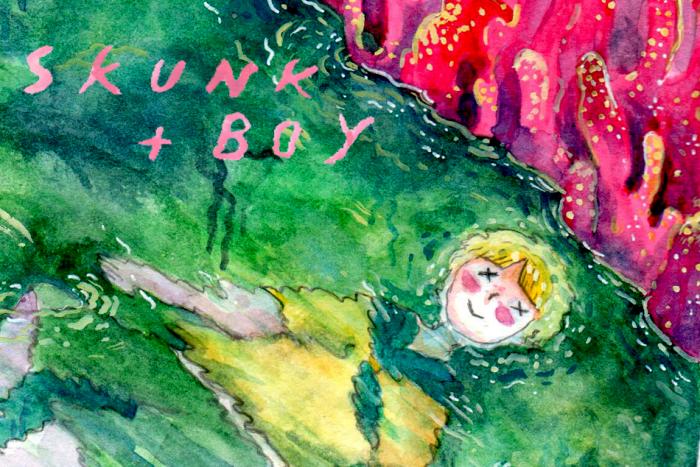The video camera bounces into a room. Amid the cheerful-end-of-neutral colour scheme and oddly low-set furniture that are the lot of campus common spaces, some college-aged kids are hanging out in the borderless way that comes from essentially living in a hive. A game of cards persists in one corner. It’s hard to know what we’re supposed to be looking at. A young man in jeans and a crewneck T-shirt walks into the frame and asks, “Are we doing it now?”
The camera, let’s assume a phone, flips back to the person holding it. A man exercising youth’s right to experiment with un-groomed facial hair looks down at us. “Larry is about to get put to sleep,” he says. His eyes and brows perform a quick, meaning-laden synchronized bob, the facial equivalent of a handspring. His eyes say: behold, beyond the curtain, see it to believe it. “By being tickled.”
It happens quickly. Without much discussion, they are mobilized. Larry—the one in the crewneck—lays himself down on the industrial grey carpet. Two friends kneel on either side, straddling his arms to pin them spread-eagle, but as soon as the tickling starts in earnest, Larry pulls free, curls in on himself. His laugh is a high, regular giggle cut with shrieks. He has very straight, white teeth. “Oh god,” he says. This is all exhale, not enough air coming in. His full-body squirming and bucking is somehow synched up with his laugh, an even beat of spasms.
It’s only ten seconds before everything that is tight turns soft. Larry’s neck releases, his mouth opens slightly.
For a moment, it’s so quiet and so empty. Then the cameraman scream-laughs into the phone, as though Larry’s hysteria has migrated from his now-limp body to the crowd of spectators. His friends prod his nostrils, lift his arm and watch it drop. A hand indelicately pulls Larry’s eyelid up to find the iris and pupil have given up their post, cast back towards his brain, leaving only blank whites gazing on the world.
One girl says, “check his pulse” three times. Finally, someone does. Larry is alive. He’s just the kind of passed out that’s like a trial run for dying—the kind that reminds us just how far a person can tether away from his body and not lose it all the way.
The cameraman turns his phone on his own face again. “This man really just passed out from being tickled,” he declares, with more eyebrow acrobatics for good measure.
*
I’m a runty six-year-old at day camp. There’s a counsellor named Virgil who can walk across an entire room on his hands. We go on a field trip, and on the school bus, Virgil tickles me (it’s the ‘90s, so this is still allowed). I’m laughing, and Virgil’s giant, wannabe-feet hands are everywhere. Even the air is a predator. I can’t breathe, and I’m pretty sure this is everything, the whole future happening at once. I drop to the floor and turn into a potato bug. When the bus moves, I roll away under the seats. A few rows back, I hit a lunch box, pop up, squeeze myself in on the bench with the girls already sitting there. They don’t seem to notice. I’m invisible. I realize I must have died.
*
When you’re ticklish, your body is an unreliable narrator. It’s disorienting how quickly disconnection can cleave between what you feel and what you express. Sure, you’re laughing, and there’s some shimmer of pleasure in that. But mostly it’s a betrayal, like your own stupid smiling face has abandoned your internal self to a very real struggle for survival.
The nature of comedy is, like being tickled, an oscillation between pleasure and pain, with both states working in tandem to create a singular experience.
The world collapses into a mess of subjects and verbs and time. It can feel like a bad trip. I’m dying. I’m already dead. And right there, in the path of the conditional future, I’m going to murder someone.
The tickle is Thanatos in Eros’s clothing. On the surface there’s the hilarity, but underneath, its real, indelible bond is with death.
*
In The Expression of the Emotions in Man and Animals (1872), Darwin filed tickling under “joy, high spirits, love, tender feelings, devotion.” He noted that in humour there is a “tickling of the mind [that] is curiously analogous with that of the body.” In order to be tickled, Darwin believed “the mind must be in a pleasurable condition.”
The following year, Ernst Hecker proposed, similarly, that tickling and jokes do the same thing to the human body. According to Hecker, both forms of laughter exert themselves on the brain as the intermittent contraction of blood vessels, pocked with relief when inhalation brings a flood of oxygen. Hecker determined that the nature of comedy is, like being tickled, an oscillation between pleasure and pain, with both states working in tandem to create a singular experience.
These nineteenth century views merged to form the Darwin-Hecker hypothesis: an association between tickling and humour that has proven nearly intractable.
*
There are two kinds of tickling.
The first, knismesis, is the sensation of something that’s very nearly not there: feathers and ants and wind. It’s all about where nerves end—the great, open plane of your body, and all the soft, barely-present things that might float over it, hardly reaching you. This is the tickle you scratch, slap, try to brush off. It’s an involuntary reaction that signals the presence of a potential irritant on the skin. You don’t laugh.
Gargalesis is that other tickle. The one with all the hands: poking, grabbing and performing a tarantella of the fingers. Hands finding their way into someone else’s not-too-sexy crevices and safes: armpit, stomach, wrong side of the knee. Unlike knismesis, which is common to many animals, gargalesis is a human tickle, something we share only with playful primates. When you are tickled in this way, there’s no uncertainty about whether or not it’s happening, and, unlike knismesis, you can’t do it to yourself. It’s a two-or-more person game.
Getting tickled is to humour what cutting an onion is to sadness.
The evolutionary purpose of gargalesis is less obvious. Many, particularly in fields like psychoanalysis and psychology, claim that tickling is part of social bonding between parents and offspring, or that it is a part of how the infant brain learns the fundamental building blocks of humour.
The other theory about why we tickle is that it’s a low-stakes form of defensive combat training. The places on the human body that are most ticklish tend to match up with soft spots where we are vulnerable, like jugular and viscera. Ticklish laughter is a way of signalling submission to your opponent. For those of us who laugh instantly when tickled, it’s a way of giving up before you even begin.
*
It’s grade five picture day. For the group shot, I’m in the front row, sitting on the floor (I’m never not in the front row). My best friend is beside me. Right before the picture is taken, she reaches around and tickles my waist to make me smile. In the resulting picture, I’m all teeth, leaning forward mug-first like I’m about to get up and run to the photographer. I seem like the happiest, keenest kid in grade five. I’m looking up at the black eye of the camera and imagining it swallowing me.
*
A study from 2000 found that rats will “laugh” (or at least emit some rat-voiced equivalent) when tickled, and over time will learn to flock to the hand that thrills them. Human-wise, scientists Alan Fridlund and Jennifer Loftis at UC Santa Barbara found in 1990 that those who identify as ticklish also admit to being quick to laugh and smile in general. This, they concluded, confirms Darwin-Hecker.
In the lab, with actual humans, things look different. In 1997, Christine Harris at UC San Diego (The UC system was apparently a hotbed of tickle studies in the ‘90s) set out to test whether ha-ha funny and tickle funny are linked by prepping subjects for tickle sessions with episodes of Saturday Night Live. This relies on the idea of emotional priming, or the “warm-up effect”: when we laugh at one thing, we are more likely to experience what comes next as funny, too. If humour and tickling share an emotional underpinning, emotional priming dictates that pre-gaming with SNL should make subjects laugh harder when they are tickled.
Her team’s findings partly confirmed the result of Fridlund and Loftis’s data: there is, indeed, a correlation between how prone an individual is to laugh at comedy and to laugh at a tickle. That is to say, laughers gonna laugh. But the same findings showed that the warm-up effect of humour on tickling is nil. Harris concluded that getting tickled is to humour what cutting an onion is to sadness.
In 2005, Harris returned to the question, this time using a coding system to examine the micro-movements on subjects’ faces when laughing at something funny, being tickled, and holding their hand in a bucket of ice water (not all at once). The results showed that even as they laugh and smile, people being tickled also give off facial cues for pain and distress. This matched the subjects’ own reports, in which they describe the experience of being tickled, even when they laughed from it, as high on anxiety and embarrassment, low on pleasure.
*
I’m nine. I’m ten. I’m eleven and getting too old for this. My older sister has tickled me so many times that getting a reaction from me no longer requires physical contact: I am so thoroughly trained that just the suggestion of her creeping fingers is enough to slay me. She tickles the air. I fall down.
*
Christine Harris’s research confirms what ticklish people already know: being tickled is pretty mirthless. So what is that feeling, then?
In 2013, two studies used fMRI to peer into the ticklish brain. You can’t get a brain read off someone experiencing gargalesis, what with all the thrashing. Instead, researchers in Germany and Switzerland scanned the brains of people having their foot tickled lightly while suppressing laughter in one study, and, in another, listening to audio recordings of others laughing from humour, being tickled, and taunting.
Both studies show that the reaction to tickling is different from humour on a neurological level. Listening to the unidentified sound of someone being tickled activated the part of the brain that processes complex, higher-order social information. It also relies more on connectivity between brain regions.
Most importantly, while both kinds of laughter light up the part of the brain that dictates facial movement, only ticklish laughter needles the hypothalamus, the little almond-shaped nugget above the brain stem in charge of our most primal, most human behaviours: thirst and hunger, sex and attachment, fight or flight, sleep.
*
In middle school, the tickling thing is a problem. Touching is a big deal. Everyone is always looking for excuses to do it. Hence tickling: the girls are supposed to giggle and squirm just enough to encourage shirts to ride up over bellybuttons. This is not my way. My struggle is not adorable. I alternate between trying to make myself disappear and lashing out in a tornado of elbows. Our faces are too close when I look into the eyes of a boy I’m failing to flirt with and tell him: “I’m dying.”
*
Surveys have shown that people are most likely to be tickled by friends, family, and lovers. The most common reasons offered for tickling were to get attention and to show affection. After adolescence, the vast majority of tickling takes place between the sexes.
While tickling isn’t straightforwardly or unequivocally sexy, it does involve bodies, and touching, and extreme emotional states. It has the ability to very quickly reverse, or confirm, a standing power dynamic. Tickling has no equality. There is the tickler and the tickled. You can’t be both. It should come as no surprise that the internet is full of tickling porn.
*
My husband Andrew tickles me, and I yell out what I think of as fair warnings: “I might break your solar plexus! I might shatter your jawbone with my knee!” To me, these are outcomes beyond my control, terrible things I’m afraid might happen more to me than by me. To Andrew, the specificity reeks a bit of fantasy. These fears sound an awful lot like threats.
*
Loosening humour’s clutches is not the only time Christine Harris’s research has pushed against ticklish assumptions. In another late-‘90s experiment, she set out to investigate just how social an activity it really is. The going theory was (and, among many, remains) that because only humans and co. tickle, ticklish laughter must be a socially conditioned reaction rather than an involuntary one.
In the study, blindfolded subjects were told the soles of their feet were being tickled once by a human, and once by a “tickling machine.” In fact, the Go-Go Gadget-like apparatus they could see, complete with a robotic-looking hand, was a functionless dummy. The real tickle machine was a grad student hiding under a table, earning her funding by gently stroking some feet. Believing that they were being tickled by something inhuman did nothing to change subjects’ ticklish responses.
*
In my early twenties, I develop two ticklish tics. One is to give off morbid gasps, the other to chant “state of mind state of mind state of mind.” The former is the unfiltered flailing of my thoughts; the latter is its antidote, a mantra I’ve come up with to hex away death with reason. My mind is trying to get any grip at all on my brain. The effect has a good ten-second shelf life.
When I’m twenty-seven, I take on an after-school babysitting gig to pick up some extra cash. (I try not to dwell on the fact that I had the same job, to three kids of the same ages as these ones, when I was twelve.) Their favourite game is Tickle Monster. I am the Tickle Monster.
Despite the wild joy it gives the kids, and the fact that they are never more pleased with my job performance, I hate playing Tickle Monster. For one thing, all the screaming and running in circles gives me a dizzy headache. For another, it’s simultaneously tiring and boring. My predator gambits are uninspired (change directions, hide behind a couch—that’s pretty much my repertoire).
Mostly, though, I don’t like Tickle Monster because once I actually catch the kids I am expected to tickle them. This risks the possibility that they will tickle me back, and in the event of this, there is no good outcome. I may go fetal at their feet, and after the exchange of power that follows, I will never again be able to control their cheese string intake. Worse, though, is the very real possibility that I might—in a way I would have to call involuntary but not accidental—lash out and punch a six-year-old in the face.
*
I have watched the video of Larry Benjamin fainting mid-tickle dozens of times. I admire what I see as evidence of the ultimate, self-immolating form of defence: the consciousness that is willing to abdicate, extinguishing itself to protect the body from what is overwhelming, even torturous. Knowing he can’t fight, his flight pattern turns inwards.
In a way, though, Larry’s response is not the highlight of the video; the effect on his friends is at least as, if not more, fascinating. They knew it was going to happen: the whole purpose of this exercise was for Larry to demonstrate his particular vulnerability (or skill, depending on your view). Still, they seem totally unprepared (they had to see it to believe it).
When it happens, there is a small detonation of emotion. They take up some new iteration of the tickle-laugh—nothing to do with funny. They demonstrate a sudden familiarity with Larry’s deflated person that feels indecorous, too many hands on too many body parts at once. One woman drums on his bicep for a while before settling on tender-aggressively patting and stroking his head and cheek. “This is tomfoolery right now,” says the girl who insisted on the pulse check.
*
While working on this essay, I’ve been asking people I meet whether or not they are ticklish. Twice, people have told me that they used to be, but now no longer are. In neither case did they claim to have grown out of it—they said they trained themselves out of it.
One of them challenged me to tickle her so she could show me her improvised work-around: she covered my hand with hers, trying to trick her mind into thinking she was the one in control. “No, wait,” she said, laughing. “This used to work.”
*
Whether they think it really is a laughing matter or not, one thing scholars of ticklishness agree on is that tickling helps us distinguish the self from the stimuli we encounter. It teaches us the difference between what we are and what we are not.
What does it mean to be a ticklish person? In my case, to be honest, it squares up with some qualities I’m not proud of, but have learned to live with. I’m a fierce blusher; I laugh and smile easily, both when it’s appropriate and when it isn’t; I sometimes have to fight tears when large groups of people cheer no matter what it’s for, just because I find the too-large outpouring irrationally overwhelming. I wouldn’t say calibrating emotional states is my strong suit.
But despite its nonsense and its terror, the familiarity of being ticklish has bred a kind of logic in me. There is a place being tickled takes me that is like no other. There, I sample something I know really isn’t, but feels like, running my fingers over some frayed end of a life. It tells me something not only about how that looks, but also what I would do in response. If you have a certain kind of morbid predilection, this is maybe not such a bad thing: to be chased to your extremes, to receive reminders from the brain’s primordial corners of your will to keep living.
What I wonder about—who I wonder about—are people who just aren’t ticklish at all. The ones walking around tickling others with impunity, not knowing how not-funny it can be to laugh yourself to the limit.






